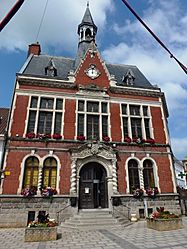Lillers facts for kids
Quick facts for kids
Lillers
|
||
|---|---|---|

The town hall of Lillers
|
||
|
||
| Country | France | |
| Region | Hauts-de-France | |
| Department | Pas-de-Calais | |
| Arrondissement | Béthune | |
| Canton | Lillers | |
| Intercommunality | CA Béthune-Bruay, Artois-Lys Romane | |
| Area
1
|
26.9 km2 (10.4 sq mi) | |
| Population
(2010)
|
10,050 | |
| • Density | 373.6/km2 (967.6/sq mi) | |
| Time zone | UTC+01:00 (CET) | |
| • Summer (DST) | UTC+02:00 (CEST) | |
| INSEE/Postal code |
62516 /62190
|
|
| Elevation | 18–88 m (59–289 ft) (avg. 29 m or 95 ft) |
|
| 1 French Land Register data, which excludes lakes, ponds, glaciers > 1 km2 (0.386 sq mi or 247 acres) and river estuaries. | ||
Lillers is a town in northern France. It is located in the Pas-de-Calais department, which is part of the Nord-Pas-de-Calais region. Lillers is known as a "commune," which is like a local government area in France.
Contents
A Look Back at Lillers' History
The story of Lillers began around the year 700 AD. Two Irish princes, named Lugli and Luglien, were on a special journey called a pilgrimage to Rome.
The Princes and a Miracle
Sadly, on their way, near a place called Ferfay, robbers attacked and killed them. Their servants buried the princes' bodies. However, a big storm later moved the bodies to the castle of the Bishop of Thérouanne. People believed this was a miracle.
How Lillers Got Its Name
Later, when the Normans invaded the area, the princes' bodies were moved again. They were now seen as holy relics and needed a safer place. They were taken to an island surrounded by a marsh. Years later, the princes' sister, Lilia, came to pray at a chapel built to hold the relics. The town was then named Lillers, in her honor.
Lillers During World War I
Lillers played an important role during World War I. It became the location of a large British military hospital.
A Place of Rest for Soldiers
Many soldiers who were injured or became ill were cared for here. Sadly, nearly 900 soldiers are buried in the cemetery in Lillers. Among them are two brave soldiers who received the Victoria Cross. This is the highest award for bravery in the British military. Their names were Corporal William Richard Cotter and Major David Nelson.
Related pages
See also
 In Spanish: Lillers para niños
In Spanish: Lillers para niños
 | Shirley Ann Jackson |
 | Garett Morgan |
 | J. Ernest Wilkins Jr. |
 | Elijah McCoy |




